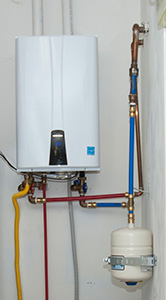How technicians affect your sales
 Technicians have a special bond with not only the equipment we service but also, most importantly, with the customers.
Technicians have a special bond with not only the equipment we service but also, most importantly, with the customers.
We have been selling propane appliances and parts for many years, and our relationship with those products is usually stronger than with any other person in the company. Often we are so in tune with our craft that we’re not aware of how much impact we have on a customer’s purchasing decisions.
When technicians talk to customers face-to-face, customers typically listen and trust what we are saying more than anyone else in the company. Why? We have been trained to fix their problems. Not over the phone, not through email, but, most importantly, in their home. This is where the special bond takes place.
Customers often trust the company to send qualified technicians to help with their problems, but it’s not until that face-to-face contact with the customers in their home or on their property that a bond is made.
Many companies have policies in place that prevent technicians from selling, with a main reason being that it may take away from our job at hand, which is repairing the customer’s problem.
One question I hear a lot is: Are technicians properly trained to sell equipment? The word “selling” doesn’t necessarily mean bringing brochures into the home, taking a lot of time with customers, writing a proposal or even closing a deal. It can be something as simple as a suggestion on a specific piece of equipment or explaining the importance of service contracts and preventative maintenance plans. Service contracts can play a major role in building customers’ confidence in the equipment and, more importantly, in your company, along with being very profitable.
One of the most important things we sell is our company’s brand, and regularly empowering customers with different options is a crucial part in maintaining that character. There is a high probability that your suggestions will create a sales lead for your company. It doesn’t necessarily mean selling equipment or parts on site, but those suggestions continue to build customer confidence in the company by entrusting them with knowledge.
Educating the customer
A few years ago, I was called to a home that had no hot water.
After introducing myself, I spent about five minutes discussing the issues with the customer. The customer mentioned the lack of hot water that morning and asked that I check the gas fireplace insert if I had time.
The water heater was a standard chimney vent, standing pilot water heater. The thermocouple was bad, which was a simple fix. Walking back upstairs with the customer, we proceeded to the gas fireplace. After about 30 minutes of troubleshooting, I found a bad on/off wall switch.
Instead of replacing the switch, I explained how a millivolt system works and the benefits of having a remote instead of the wall switch. The customer decided to go with the remote. Standing in front of the now-warm fireplace, I explained what happened to the water heater and what part I replaced. I ended by explaining the advantages of replacing the customer’s 20-year-old water heater. We talked quickly about new water heater insulation standards, ignition systems, efficiencies and new venting methods.
A few weeks later, I was dispatched to the same home to install a new tankless water heater. By taking the extra 10 minutes to go into detail explaining the work performed, we ended up selling a fireplace remote and a tankless water heater.
Simply put, the more technicians educate customers, the more sales the company receives. Upselling occurs in every industry, but often we don’t utilize some of our greatest strengths in the process.
Technicians are a key component to product sales, and it’s important to promote education on the latest equipment and techniques. By empowering technicians to take their time with customers, companies can expect to see an increase in customer sales and satisfaction.
Ryan Card is the service manager for D.F. Richard Energy in Dover, N.H. He can be reached at rcard@dfrichard.com or 603-516-3225.

















Great article.
I really like your new column.
Thanks Stuart!
Great job ryan!!
Wow Ryan! Great writing! I enjoyed and can relate to your story! Thanks to the Technicians! They are the front lines for every business and typically don’t get enough credit.
Another great article! …if the industry can improve the customer-technician communication process it will be big for retaining customers and growing gallons!
Great article. I managed a business unit once that had six technicians. We had about 4,600 active customers in both oil and propane. We eventually had about 1,000 service contracts. For a span of close to 10 years we were installing about two heating systems a week. Better than half of these leads came from our techs while they were doing annual tune-ups. We educated our techs to the point where they had a “ballpark” price they could quote a customer. It was always a little higher than the actual proposal ended up being. The techs were also made aware of financing packages we had to offer. Better than half of our sales took advantage of this. Without question keeping techs aware of the latest equipment the industry has to offer pays off!